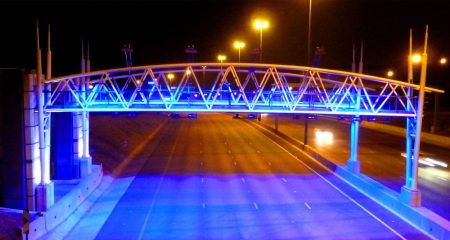
Roads agency Sanral blamed the e-tolls review panel for negatively affecting the agency’s final bond auction for the year on Wednesday.
“Investor confidence in Sanral has been negatively impacted by the uncertainty created by the Gauteng government’s decision to set up an e-toll review panel,” a statement said.
Sanral sought to raise at least R500m, as the next auction was scheduled only for February 2015, Sanral said in a statement.
“Even though total bids of R765m were received the prices were much wider than the guidance and therefore only R415m was allocated.”
A bond is a debt investment where an investor lends money to an entity which borrows the money for a set time period at a fixed interest rate.
Bonds are used by companies and different levels of government to finance different projects and activities.
Sanral said the lack of investor interest was unfortunate given the presentations made by transport minister Dipuo Peters and senior government officials to the panel over the past two days.
“The minister expressed strong support for Sanral indicating that the e-toll system in Gauteng will continue in terms of decisions taken by the cabinet,” the agency said.
“The result of this auction once again demonstrated the close relationship between government decisions and Sanral, as a government implementing agency.”
Sanral chief financial officer Inge Mulder said: “Investors are sensitive to policy uncertainty and they clearly communicated this today.”
She trusted Peters’s “strong endorsement” of the agency to the panel on Tuesday, and her assurance of government support, would reduce future uncertainties and draw investors back to future auctions.
Mulder said Sanral would continue to do their best to ensure they produced and maintained roads that were safe, time effective, and cost effective to use.
At the panel on Wednesday, transport department acting director-general Mawethu Vilana said price inflation could not be blamed on the cost of Gauteng’s e-tolls.
“If there are problems in the pricing structure, it is not an e-toll problem,” Vilana told the panel in Pretoria.
Trucking and goods companies decided on prices and were in the wrong if they decided to impose exorbitant prices due to the tolls, he said.
One of the arguments against the electronic tolling system had been that it would increase the prices of goods transported by road.
Vilana argued that if a truck paid R1,50/gantry the cost of a single item in the truck should not be increased by that amount. Instead the R1,50 should be spread across all the goods in the truck.
“But it just can’t be an e-toll problem,” said Vilana, adding that goods pricing fell out of his department’s jurisdiction.
Vilana was answering questions from the panel appointed by Gauteng premier David Makhura in July to review the tolling system.
It was set up to examine the economic and social impact of the Gauteng Freeway Improvement Project and the e-tolling system set up to fund it.
The panel was expected to present its findings to Makhura at the end of the month. — Sapa




